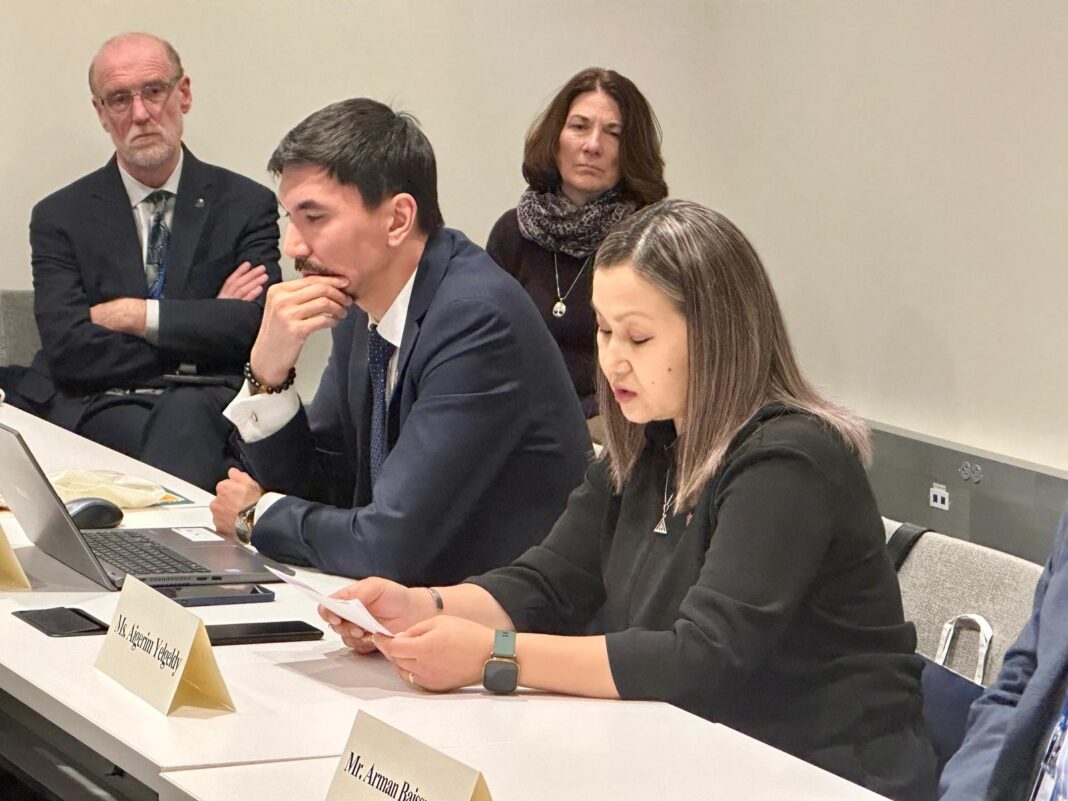The following is a presentation by Aigerim Yelgeldy, the 3rd generation survivor of the Nuclear Testings in Semipalatinsk Nuclear Weapons Testing Stite at a side event during the 2nd meeting of the States Parties to the Treaty on the Prohibition of Nuclear Weapons. The side event was co-organized by the Center for International Security and Policy (CISP), Soka Gakkai International (SGI), the International Campaign to Abolish Nuclear Weapons(ICAN) and the Kazakhstan Mission to the UN.
By Aigerim Yelgeldy
United Nations (INPS Japan) — I, Aigerim Yelgeldy, 35 years old, am from the city of Semey (Semipalatinsk) in Kazakhstan. This city is famous for the fact that many Kazakh famous cultural figures, politicians, and artists were born here. But, unfortunately, for the whole world, this city is also known for the fact that nuclear weapons tests were conducted in this region for 40 years. According to archival data, 473 nuclear explosions were carried out at the Semipalatinsk test site, including 90 in air, 26 on the ground, and 354 underground ones, covering area of 18,500 square kilometers from 1949 to 1989. In addition to nuclear tests, 175 chemical explosions were carried out here, 44 of them with charges of more than ten tons.
The region’s environment was irreparably damaged, animals and birds were affected, and water resources were polluted. But worst of all people who lived in the region were affected.
Of course, I didn’t see many of these nuclear tests when the last explosion occurred at the test site in 1989, I was only one year old. And yet, for many residents of our region, including me, the nuclear tests did not pass without a trace. I am one of the third generation of people affected by nuclear weapons tests.
In August 2015, doctors diagnosed me with enlarged lymph nodes in the left supraclavicular. For some time, an antibacterial treatment was used, but this did not give the necessary effect. My lymph nodes continued to grow, and my health worsened. I was constantly feeling myself unwell, my memory was very poor, and I constantly felt disoriented. The disease affected me very much emotionally – it was very difficult to accept and realize that I was faced with this disease.
Later, I was sent to the Center of Nuclear Medicine and Oncology (Semey), where I had an additional medical examination. As a result, the following diagnosis was given to me – the nadular sclerosis with lesions of the intra-thoracic and supraclavicular lymph nodes. Since this year, I have went through many courses of radiation therapy and chemotherapy, my lymph nodes were removed, and because of this, I cannot lift my left arm up.
In 2022, I relapsed again – an increase in the lymph nodes on the left side of the iliac region was again observed. I’m currently receiving immunotherapy. A couple of months ago, lymph nodes were also formed in the neck, abdominal cavity, and left lung.
I have been fighting cancer for more than 8 years now. The disease may be treatable, but it doesn’t come easily to me. Constant joint pain, swelling, constant weakness, dizziness, drowsiness. As a result of the disease, I have to limit myself in many ways – I can not lift weights, physical exertion is contraindicated, sudden temperature changes are harmful. I can’t enjoy the sun like many ordinary people.
But, perhaps the most difficult thing is that I can’t have children. It is a great heartache for me – not to be able to experience the joy of motherhood. But on the other hand, I understand that becoming a mom would put my children at risk of going through the same pain and suffering. It’s very hard.
My family and friends help me to overcome all these challenges – I have a big family, my father, mother, my brothers and sister. Thank you to my spouse, who supports me and helps me all this time, my dad and mom gave me a lot of moral support, and later I met my spouse, who also supports me. It was his sensitivity, care, and support that helped me overcome my depression and live a life again. Thank you to the doctors of the Center for Nuclear Medicine and Oncology, who have been helping me overcome the disease all these years.
The problem of cancer is not new for me and my family – in the past, cancer was diagnosed my aunt in 1999, and in 2004 my mother. Of course, science still disputes the origin of cancer, but my personal opinion is that the growing number of cancer diseases in my region is a direct influence of nuclear tests. Unfortunately, there are hundreds of thousands of families like mine who have faced the consequences of nuclear weapons tests.
Today, having experienced all the hardships associated with cancer, I strive to support all those who also faced this problem. We have a whole community in which we try to morally and emotionally support those who have just encountered this problem, share advice, experience, and do everything possible so that people do not give in to despair and fear.
But most importantly, I am convinced that the tragedy and pain that my compatriots have experienced and continue to experience due to nuclear tests should never happen again. People in the 21st century should use the energy of the atom only for peaceful purposes, for the benefit of progress and development.
INPS Japan


